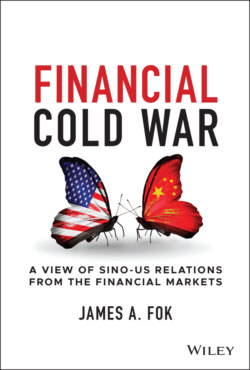Читать книгу Financial Cold War - James A. Fok - Страница 10
Acknowledgements
ОглавлениеMy first thanks must go to my wife Yeone, who initially encouraged me to write this book as a way of passing some spare time while stuck at home during the Covid-19 pandemic. She probably hadn't imagined that it would become such an engrossing diversion as to cause me to neglect most of my familial duties for many subsequent months. As I disappeared (at least mentally) into the research and writing, she only very occasionally complained about having to shoulder most of the burden of looking after our five-year-old twins. On top of that, Yeone reviewed the first draft of each section, asked a ton of questions, and pushed me to add colour to illustrate my arguments. I hope that the final work at least partially justifies her sacrifices.
My next thanks go to Mark Bentley. Mark gave me my first job in financial services and has been a consistent friend and mentor ever since. While working on this book, I spent countless hours in conversation with him discussing many of the ideas contained in it. Mark and I have very different perspectives (he is an ardent free marketeer who talks of Milton Friedman in the same reverent tones reserved for saints of the church), but his impressive ability to dissect arguments and challenge the flaws in them undoubtedly improved the final work considerably.
This book also owes a huge debt to the work of the many authors and writers whose books, research papers and articles are listed in the bibliography. I now realise what an enormous amount of effort goes into all of this, and I am extremely grateful to each of them.
Along the way, I have had a lot of help. Much of what I have learned about financial markets has come from former colleagues, business partners, professional advisors, regulators and clients. There are far too many to name each of them here, but I am deeply grateful to all those who have shared the highs and supported me through the lows of my career thus far, and to each and every one who has made my work so much fun over the years.
Specifically in relation to this book, thanks go to Bryan Cheuk and Kenneth Lock, who helped with research on the economic and financial data that appear in it. I am also grateful to Alokik Advani, Andrew Bernard, Cheah Cheng Hye, Rebecca Chua, Fu Hao, Jeremy Grant, Patrick Jacquelin, Sue Johnson, Kai Keller, Paul Kennedy, Michael Lam, Li Yingying, Max Lummis, George Magnus, Michael Moser, James Muir, Edmund Ng, Lisa O'Connor, Matt O'Neill, Ketan Patel, Patrick Young and Zhou Bo, who reviewed various chapters and provided helpful feedback and encouragement.
There are a number of people to whom I am particularly indebted for their extensive comments and advice.
Mustansir Barma provided very detailed feedback on the draft manuscript and corrected several factual errors.
Roland Chai urged me to consider more deeply how digital currencies might affect the future development of the global financial system. Adam Wielowieyski then introduced me to a wide range of research in this area and was exceedingly patient in answering my many questions. This effort was not only interesting and rewarding, but it also led me to change some of my final conclusions.
Jonathan Chow provided insightful feedback on the structure of the book and editing advice, which put better focus on the key arguments. He also gave me some helpful suggestions on the title of the book and various sections.
Nick Gardiner sent me pages of meticulously typed notes on the manuscript, with a huge number of valuable questions and suggestions.
Katie Kolchin was a wealth of information on US financial statistics and much more. Her eye for detail helped significantly improve the chapters covering the development of the US market.
After I thought I had a near-final draft of the manuscript, a mutual friend suggested that I ask Henny Sender to take a look at it for me. I had met Henny a number of years before and knew her to be very thoughtful and knowledgeable about China's financial markets. I was incredibly fortunate that Henny not only looked at the draft for me, but drilled into the manuscript, pushing me to clarify each passage with a sort of nurturing iron discipline I had not encountered since visits to the school matron's surgery at boarding school. Without a doubt, this resulted in a far more polished work than I could ever have accomplished on my own.
Several others provided very helpful comments and advice on the manuscript, but would prefer to remain anonymous. I am deeply grateful to each of them.
Ronald Chan, Uther Charlton-Stevens, Mark Makepeace, Sophie Chen Keller and Shan Weijian gave me extensive advice on the publishing process and were extraordinarily generous with their contacts. I ultimately chose to work with Wiley because of the incredible enthusiasm that Gladys (Syd) Ganaden showed in the project right from the start. Syd, together with Purvi Patel, Sylvie Docherty, Philo Antonie Mahendran and the entire Wiley team were friendly, professional and a delight to work with throughout the process. I am also very grateful to Amita Haylock and Cheng Hau Yeo of Mayer Brown for their professional support and practical advice.
Finally, I must thank Stephanie Tsui for her daily support over many years. Without her efficiency in organising my life, this book would never have been completed.
That all said, any errors, omissions or other failings in this final work (of which I am sure there are many) are my responsibility. I must also stress that the views expressed herein are mine alone, and do not claim to represent those of any of the individuals who have provided advice or support. Nor do they represent the views of any of my former employers or other organisations with which I am associated.
– James A. Fok
Hong Kong
4 October 2021
